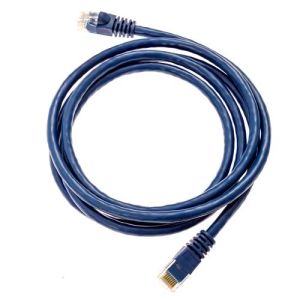
Polycab Optical Fiber Cable
Get Price Quote

Fiber Cable
Get Price Quote
Best Deals from Fiber Optic Cables

patch cables
125 Per
100 Piece (MOQ)

Fiber Optic Cable
Get Price Quote
Optical Fiber is a unique transmission medium. It has some unique advantages over conventional communication media such as copper wire, microwave or co-axial cables. The major advantage is its high transmission capacity. Fiber Optics is the least expensive, most reliable method for high speed and / or long distance communications. The medium used in Fiber optic transmission is glass or plastic.

Fibre Optic Cables
Get Price Quote
A technology that uses glass (or plastic) threads (fibers) to transmit data. A fiber optic cable consists of a bundle of glass threads, each of which is capable of transmitting messages modulated onto light waves. Fiber optics has several advantages over traditional metal communications lines SPEED : Fiber optic networks operate at high speeds - up into the gigabits BANDWIDTH : large carrying capacity DISTANCE : Signals can be transmitted further without needing to be "refreshed" or strengthened. RESISTANCE : Greater resistance to electromagnetic noise such as radios, motors or other nearby cables. MAINTENANCE : Fiber optic cables costs much less to maintain. Unique Electro Traders offers cables with Single mode Fiber G652B, G652D, G655, G657 and in Multi-mode OM1 (62.5/125), OM2 (50/125), OM3 (50/125), OM4 (50/125) and also manufactures as customer's specifications. UNITUBE and LOOSE TUBE (MULTI-TUBE) CABLES ARMOURED/UNARMOURED SM/MM CABLES (UPTO 144 FIBRES) CABLES WITH ROUND WIRE ARMOUR AND FRLS ZERO HALOGEN SHEATH OPTION ADSS and AERIAL FIGURE 8 CABLES RIBBON CABLES UP TO 512 FIBERS TACTICAL CABLE FOR DEFENCE SYSTEM TORPEDO FIBER OPTIC CABLE It has many special fiber optic cable designs for application in critical areas like: Optoflex Festoon cable for heavy duty Cranes Under water fiber optic cable Fire Survival fiber optic cable Zero Halogen sheath for Oil & Gas sector Round Steel Wire Armouring for protection Tactical cable with fiber in stainless steel tube In recent years it has become apparent that fiber-optics are steadily replacing copper wire as an appropriate means of communication signal transmission. They span the long distances between local phone systems as well as providing the backbone for many network systems. Other system users include cable television services, university campuses, office buildings, industrial plants, and electric utility companies. A fiber-optic system is similar to the copper wire system that fiber-optics is replacing. The difference is that fiber-optics use light pulses to transmit information down fiber lines instead of using electronic pulses to transmit information down copper lines. Looking at the components in a fiber-optic chain will give a better understanding of how the system works in conjunction with wire based systems. At one end of the system is a transmitter. This is the place of origin for information coming on to fiber-optic lines. The transmitter accepts coded electronic pulse information coming from copper wire. It then processes and translates that information into equivalently coded light pulses. A light-emitting diode (LED) or an injection-laser diode (ILD) can be used for generating the light pulses. Using a lens, the light pulses are funneled into the fiber-optic medium where they travel down the cable. The light (near infrared) is most often 850nm for shorter distances and 1,300nm for longer distances on Multi-mode fiber and 1300nm for single-mode fiber and 1,500nm is used for for longer distances. Think of a fiber cable in terms of very long cardboard roll (from the inside roll of paper towel) that is coated with a mirror on the inside. If you shine a flashlight in one end you can see light come out at the far end - even if it's been bent around a corner. Light pulses move easily down the fiber-optic line because of a principle known as total internal reflection. "This principle of total internal reflection states that when the angle of incidence exceeds a critical value, light cannot get out of the glass; instead, the light bounces back in. When this principle is applied to the construction of the fiber-optic strand, it is possible to transmit information down fiber lines in the form of light pulses. The core must a very clear and pure material for the light or in most cases near infrared light (850nm, 1300nm and 1500nm). The core can be Plastic (used for very short distances) but most are made from glass. Glass optical fibers are almost always made from pure silica, but some other materials, such as fluorozirconate, fluoroaluminate, and chalcogenide glasses, are used for longer-wavelength infrared applications. There are three types of fiber optic cable commonly used: single mode, multimode and plastic optical fiber (POF). Transparent glass or plastic fibers which allow light to be guided from one end to the other with minimal loss.

Digital Optical Cables O.d.: 4.0mm
Get Price Quote
Digital Optical Cables O.d.: 4.0mm, Hi-Fi Cable, Electrical Relays

Fiber Optics
Get Price Quote
Fiber optics, We manufacture Unitube cables up to 24Fiber, Loose Tube cables upto 432 Fiber and Ribbon Cables up to 576 Fibers. Cables are offered in various design constructions as per customer requirements variants like DUCT, ARMOURED, ADSS, Fig. 8 etc. Also offered are cables for FTTH constructions.

submarine cables
25 Per Meter
100 Meter (MOQ)

Fiber Optic Cable
Get Price Quote
Fiber Optic Cable, ht power cable, Lt Power Cables

Fiber Optic Cables
Get Price Quote
Fiber Optic Cables, Rubber Cables

Fiber Optic Cables
Get Price Quote
We are supplying smf g 652b,g652d,g655,g657a1 and om1,om2 & om3 and fiber optic cables including opgw and catv from taihan fiber optics ltd,korea.

Fiber Optic Cables
Get Price Quote
Fiber Optic Cables, Optical Fiber Cables

optic cable fibers
Get Price Quote
optic cable fibers, SOLAR PANELS, Pipes, Nuts, Ball Bearings